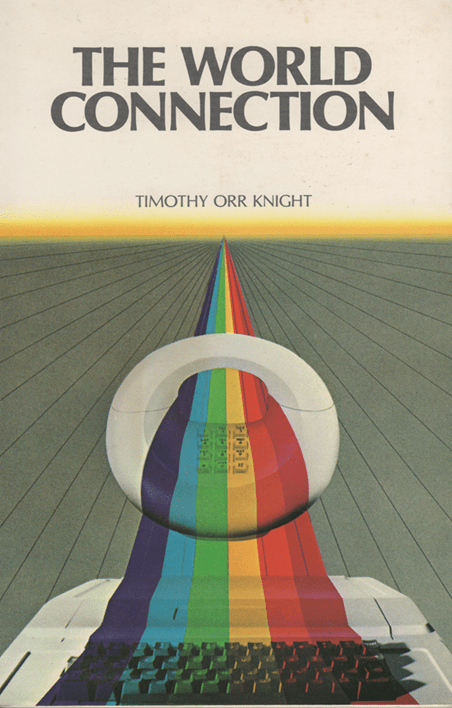In 1982, I wrote my first book, The World Connection, which was published by Howard Sams  Publishing in early 1983 when I was still 16 years old. (I had already been writing for national computer magazines for about a year). I would go on to write a couple dozen more books, including those listed here on the blog, but “TWC” would always have a special place in my heart, sort of like a first child.
Publishing in early 1983 when I was still 16 years old. (I had already been writing for national computer magazines for about a year). I would go on to write a couple dozen more books, including those listed here on the blog, but “TWC” would always have a special place in my heart, sort of like a first child.
The reason this topic came up is because my sister must have been cleaning out an old closet, and she found a copy of this book that I sent her over three decades ago. I hadn’t read the book since it came out, and I was curious to see how my writing had changed and how accurate my prophecies were.
Well, mercifully, my writing has gotten better over the years (which I would hope, since I’ve done over 10,000 posts on this blog as well as the aforementioned books, the most recent of which was pretty lengthy). My predictions were also pretty damned good, particularly for a sheltered 16 year old suburban boy. As you read these, I want you to keep in mind that only a tiny percentage of the United States (and a much tinier part of the world in general) had personial computers, and of those, a tiny percentage had modems. So I was a very, very early adopter, and while these predictions may seem quaint today, remember that it was 1983. Here goes:
“It could well happen that in about ten years or so, people might be spending a little less time watching television and talking on the telephone and much more time using their computer to communicate with other computers and other people. This could be a very positive step if the main sources of information continue in the direction that they are headed now – education and entertainment. However, if most of these information bases rely on “fluff” to attract major audiences (like some television networks have done), it may not have a positive effect at all.” – I guess I was hoping people would actually want to improve themselves. Now, in the age of the Kardashians, it’s clear that “fluff” has won the day.
“Perhaps, one day, computers may be used to determine the exact structure of an object and, then, be able to reproduce it at another place through the use of telecommunications.” 3D printing, anyone? I think it’s pretty cool I even imagined this.
“In the future, however, more advanced electronic mail could certainly put a dent into the U.S. Postal Service’s huge industry. Not only will longer letters be possible in the future but, also, there will be letters with pictures (electronically produced), more widespread message delivery, and even the power to save all your mail onto computer disks, or paper, or both” – Yeah, well, I’d say I nailed that one.
“Perhaps you will be able to call up a computer system, order a piece of software (paying with either a credit card or even a futuristic “debit” card) and, then, have the software downloaded to your system. This means instant software purchasing, which would be a great convenience to many people. As far as documentation is concerned, that could also be transmitted electronically and simultaneously printed out onto a printer. This type of software buying would be much more efficient, and software prices could be cut drastically because of lower overhead (no salespersons or packaging are needed).” – Yep, all the way around – – and bonus points for the “futuristic debit card” (like, say, Bitcoin).
“Expansions and improvements in banking through your computer should attract many new customers and could ultimately lead to the point where you can perform almost all of your business through your home computer or terminal. Flight reservations, theatre tickets, and even the buying of groceries through computers communications are just a few of the conveniences that are just around the corner.” – Expedia. Fandango. And, briefly, Webvan. We are drowning in conveniences!
Ya know, I’ve got to tip my hat to my 16-year old self. I had a fairly optimistic view of technology’s future, and I honestly wasn’t able to find a single “miss” in the book (although I didn’t predict cell phones, but that wasn’t really what the book was about anyway). I was already envious of my teenage self. He had a pretty awesome life around the ages of 16 and 17. Reading this book makes me crave that time machine even more. If Slope suddenly stops updating, you’ll know I’m returned to the age of Reagan, where I belong.

